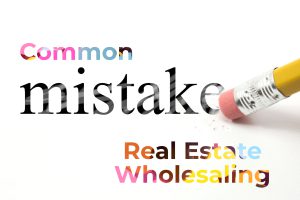Real Estate Wholesaling – How to get started with Real Estate Wholesaling?
Real Estate Wholesaling is a popular and lucrative strategy in the world of real estate investing. It serves as an excellent entry point for beginners looking to enter the industry without significant financial resources or prior experience in property management or renovations. In this section, we’ll provide an overview of wholesaling real estate, its definition, how it differs from traditional investing, and the benefits and risks associated with this strategy.
Definition of Wholesaling Real Estate:
Wholesaling real estate, often referred to as real estate wholesaling or simply wholesaling, is a transaction-based investment strategy that involves finding deeply discounted properties and quickly passing them on to other investors, typically for a fee. In this process, the wholesaler acts as an intermediary between motivated sellers and real estate investors, facilitating the transfer of the property’s contract rights without actually taking ownership of the property.
How Wholesaling Differs from Traditional Real Estate Investing
Wholesaling differs significantly from traditional real estate investing in several key ways:
- No Ownership: Unlike traditional investing, where the investor purchases the property to hold, rent, or renovate, wholesalers do not acquire ownership of the property. Instead, they focus on securing a contract with the seller and then assigning that contract to an end buyer.
- Quick Transactions: Wholesaling involves quick transactions with minimal holding periods. Wholesalers aim to find and assign properties within a short timeframe, often in a matter of days or weeks.
- Lower Capital Requirements: Wholesaling requires less capital compared to traditional investing. Wholesalers don’t need to invest large sums of money for down payments, repairs, or ongoing expenses associated with property ownership.
Benefits and Risks of Wholesaling:
- Minimal Risk: Wholesalers face lower risks as they are not investing large sums of their own money in properties.
- Quick Profits: Successful wholesaling can lead to fast profits, especially when the wholesaler identifies lucrative deals.
- Building Networks: Wholesalers develop valuable relationships with motivated sellers and real estate investors, expanding their network in the industry.
- Risks and Challenges of Wholesaling Real Estate:
- Competition: The real estate wholesaling market can be competitive, with other wholesalers and investors vying for the best deals.
- Finding Motivated Sellers: Locating motivated sellers willing to sell their properties at significant discounts can be challenging.
- Legal and Ethical Considerations: Wholesalers must adhere to local laws and regulations related to contract assignments and ensure ethical practices in their dealings with both sellers and buyers.
Understanding the Wholesaling Process

Wholesaling real estate involves a series of well-defined steps that wholesalers follow to identify distressed properties, negotiate with motivated sellers, and assign contracts to end buyers for a profit. In this section, we’ll provide a comprehensive overview of the wholesaling process, from finding potential deals to building a buyers’ list and executing successful transactions.
Role of a Real Estate Wholesaler
A real estate wholesaler acts as a middleman between sellers who need to sell their properties quickly and real estate investors seeking lucrative deals. The wholesaler’s primary role is to identify discounted properties, negotiate favorable terms with sellers, and then assign the contract to an investor who will take over the deal. Wholesalers typically make money through an assignment fee paid by the end buyer.
Identifying Motivated Sellers
- Distressed Properties: Wholesalers often target distressed properties that may be facing foreclosure, require significant repairs, or have been on the market for an extended period. These sellers are often more motivated to sell at a discount.
- Direct Marketing: Wholesalers use various direct marketing methods, such as direct mail campaigns, bandit signs, and online advertisements, to reach potential motivated sellers. These marketing efforts aim to generate leads and attract sellers looking for a quick and hassle-free sale.
Locating Distressed Properties:
- Driving for Dollars: Wholesalers drive through target neighborhoods, identifying distressed properties that show signs of neglect or are in need of repair.
- Online Platforms and Auctions: Wholesalers also search for distressed properties on online real estate platforms, foreclosure listings, and auction websites.
Analyzing Deals and Estimating ARV (After Repair Value)
Wholesalers must analyze potential deals to ensure they are viable and offer a profit margin for both themselves and the end buyer. Key steps include:
- Property Evaluation: Wholesalers assess the property’s condition and estimate the cost of repairs required to bring it to market standards.
- Comparable Sales Analysis: Wholesalers conduct a comparative market analysis (CMA) to determine the property’s ARV based on recent sales of similar properties in the area.
Negotiating with Sellers and Putting Properties Under Contract:
- Communication with Sellers: Wholesalers engage in effective communication with motivated sellers, understanding their needs and motivations for selling quickly.
- Offer Presentation: Wholesalers make fair but discounted offers to sellers, considering the property’s condition, market value, and the seller’s urgency to sell.
- Executing Purchase Contracts: Once an agreement is reached, wholesalers use purchase contracts, often including contingencies to protect their interests, to put the property under contract.
Building a Buyers’ List of Investors
Wholesalers actively build and maintain a database of real estate investors interested in purchasing wholesale deals. Key strategies include:
- Networking: Wholesalers attend local real estate meetups, networking events, and investment clubs to connect with potential buyers.
- Online Presence: Wholesalers utilize social media, real estate forums, and dedicated websites to attract investors and showcase their deals.
Legal and Regulatory Considerations

By effectively understanding and executing the wholesaling process, real estate wholesalers can establish themselves as valuable intermediaries in the real estate market. In the next sections, we will delve deeper into the legal considerations, marketing strategies, and negotiation tactics that contribute to successful wholesaling transactions.
Wholesaling real estate involves navigating various legal and regulatory considerations to conduct transactions ethically and within the bounds of the law. Understanding the legal framework and compliance requirements is essential for protecting both the wholesaler’s interests and the rights of the involved parties. In this section, we’ll explore key legal considerations for real estate wholesalers.
Licensing Requirements for Wholesaling
In the United States, licensing requirements for real estate wholesalers can vary from state to state. Some states may require wholesalers to hold a real estate license, while others may exempt them from licensing requirements under certain conditions. It is crucial for wholesalers to research and understand the specific licensing regulations in their state to avoid any legal issues.
Understanding Contract Assignments
Contract assignments are a fundamental aspect of wholesaling real estate. An assignment involves transferring the rights and obligations of a purchase contract from the original buyer (the wholesaler) to an end buyer (the investor). However, some states have specific rules and restrictions regarding contract assignments. Wholesalers should familiarize themselves with these rules and ensure that contract assignments are executed correctly and legally.
Complying with State and Local Law
Real estate laws and regulations can vary significantly at the state and local levels. Wholesalers must be aware of and comply with all applicable laws related to real estate transactions, including contract laws, disclosure requirements, fair housing laws, and anti-fraud regulations. Non-compliance can lead to legal disputes, financial penalties, and reputational damage.
Potential Risks and Liabilities
- Misrepresentation: Wholesalers must be honest and transparent in their dealings with sellers and buyers. Misrepresenting property details or exaggerating potential profits can lead to legal disputes and damage the wholesaler’s reputation.
- Breach of Contract: Failing to perform contractual obligations, such as not closing on a property after securing it under contract, can result in breach of contract claims and potential legal action.
- Securities Laws: In some cases, real estate wholesaling deals may fall under securities laws if they involve pooling funds from multiple investors or selling interests in real estate without proper registration. Complying with securities laws is essential to avoid legal complications.
Consultation with Legal Professionals
Given the complexity of real estate laws and regulations, wholesalers are advised to seek legal counsel to ensure their business practices are in full compliance with applicable laws. Real estate attorneys with experience in wholesaling can provide valuable guidance and help wholesalers navigate legal challenges.
Marketing Strategies for Wholesalers

Effective marketing is crucial for real estate wholesalers to generate leads, attract motivated sellers, and build a network of potential buyers. As wholesalers typically work on a tight timeframe, implementing targeted and efficient marketing strategies is essential for identifying profitable deals. In this section, we’ll explore some key marketing methods that wholesalers can utilize to enhance their reach and maximize deal opportunities.
Effective Marketing Channels:
- Direct Mail Campaigns: Direct mail remains a popular marketing method for wholesalers. Sending targeted postcards or letters to property owners in distressed neighborhoods or those facing foreclosure can yield motivated seller leads.
- Online Advertising: Utilize online advertising platforms such as Google Ads and Facebook Ads to target specific audiences based on location, property characteristics, and behavior. Online ads can generate leads and drive traffic to your website or landing page.
- Bandit Signs and Flyers: Placing bandit signs (small signs placed in high-visibility locations) and distributing flyers in target neighborhoods can attract sellers looking for quick solutions to sell their properties.
- Networking and Word of Mouth: Building relationships with local real estate agents, investors, property managers, and other professionals can lead to word-of-mouth referrals and potential joint venture opportunities.
Creating a Compelling Value Proposition for Sellers and Buyers
- For Sellers: Craft a persuasive value proposition that highlights how wholesalers can offer a fast and hassle-free sale, cash transactions, and the convenience of handling closing costs and paperwork.
- For Buyers: Attract potential investors by showcasing your ability to find discounted deals, conduct thorough deal analysis, and provide valuable off-market opportunities that align with their investment criteria.
Building an Online Presence and Branding
- Professional Website: Develop a user-friendly website that showcases your services, expertise, and successful deals. Provide valuable content and resources for both sellers and buyers, establishing yourself as a knowledgeable wholesaler.
- Social Media Engagement: Utilize social media platforms to engage with your audience, share valuable insights, and showcase your success stories. Social media can be an effective tool for building credibility and attracting leads.
- Email Marketing: Build an email list of interested sellers and buyers and use email marketing to keep them informed about your latest deals, market trends, and real estate news.
Analyzing Marketing Results
Track and analyze the performance of your marketing efforts to identify which channels and strategies yield the best results. Use data analytics to refine your marketing campaigns and focus on the most productive channels.
Leveraging Online Real Estate Marketplaces
Utilize online real estate marketplaces, such as Zillow, Trulia, and Craigslist, to list and promote your wholesale deals. These platforms have large audiences of potential sellers and investors actively seeking real estate opportunities.
Implementing a Follow-Up Strategy
Consistent follow-up is essential in real estate wholesaling, as some sellers may not be immediately ready to move forward with a sale. Implement a follow-up strategy to nurture leads and maintain communication with potential sellers until they are ready to proceed.
Deal Analysis and Due Diligence

Deal analysis and due diligence are critical aspects of real estate wholesaling. As a wholesaler, your ability to accurately analyze potential deals and conduct thorough due diligence will determine the profitability and success of your transactions. In this section, we’ll delve into the key steps involved in deal analysis and due diligence to ensure you identify profitable opportunities and mitigate potential risks.
Property Evaluation
- Assessing Property Condition: Visit the property and conduct a comprehensive inspection to evaluate its overall condition. Take note of any repairs or renovations needed to bring the property to market standards.
- Estimating Repair Costs: Accurately estimate the cost of repairs required to address any issues identified during the inspection. This estimation will impact the overall deal analysis and the potential profit margin.
Comparative Market Analysis (CMA)
- Determine the ARV (After Repair Value): Research recent sales of comparable properties in the neighborhood to estimate the property’s ARV. The ARV will help you determine the potential selling price after repairs and renovations.
- Analyze Market Trends: Stay updated on current market trends, such as property demand, rental rates, and property appreciation, to understand the potential growth of the property’s value.
Assessing Property Title and Liens:
- Title Search: Conduct a title search to ensure there are no outstanding liens, encumbrances, or legal issues that could affect the property’s marketability.
- Title Insurance: Consider obtaining title insurance to protect yourself and the end buyer from any potential title-related issues that may arise in the future.
Financial Analysis:
- Calculate Maximum Allowable Offer (MAO): Use the property’s ARV, estimated repair costs, and desired profit margin to calculate the MAO. The MAO is the highest price you can offer while ensuring a profitable deal.
- Account for Transaction Costs: Include closing costs, holding costs, and any other transaction-related expenses in your financial analysis.
Identifying Potential Deal Breakers
- Legal and Zoning Issues: Be aware of any zoning restrictions or legal issues that may limit the property’s use or development potential.
- Environmental Concerns: Investigate potential environmental hazards or contamination on the property that could impact its value or future development.
Working with Contractors and Inspectors
- Hire Qualified Contractors: Engage reliable and experienced contractors to provide accurate repair estimates and perform quality work.
- Property Inspection: Consider hiring a professional home inspector to identify any hidden issues that may not be apparent during your initial assessment.
Evaluating Profitability and Risk
- Determine Profitability: Based on your financial analysis and ARV, assess the potential profit margin of the deal to ensure it meets your investment objectives.
- Risk Assessment: Consider the potential risks associated with the property, market conditions, and the viability of your exit strategy.
Negotiation and Contract Management

Negotiation and contract management are essential skills for real estate wholesalers. Effective negotiation allows wholesalers to secure favorable deals with motivated sellers, while proficient contract management ensures a smooth and legally compliant transaction process. In this section, we’ll delve into key strategies for successful negotiation and the crucial aspects of contract management in wholesaling real estate.
Negotiation Strategies for Wholesalers:
- Active Listening: Listen carefully to the seller’s needs and motivations. Understanding their situation and goals will enable you to tailor your offer and negotiate more effectively.
- Build Rapport: Establish a positive and professional relationship with the seller. Building rapport can increase the seller’s trust in you and make negotiations more collaborative.
- Presenting Your Value Proposition: Clearly articulate the benefits of working with you as a wholesaler, such as a fast and hassle-free sale or the ability to handle closing costs.
- Be Respectful and Understanding: Respect the seller’s perspective and be empathetic to their circumstances. Avoid aggressive or confrontational behavior during negotiations.
- Be Prepared to Walk Away: Know your maximum allowable offer (MAO) and be prepared to walk away from deals that don’t meet your criteria. This demonstrates your commitment to securing profitable opportunities.
Crafting Investor-Friendly Purchase Contracts
- Use Clear and Concise Language: Ensure that the contract is written in clear and understandable language to avoid confusion and misinterpretation.
- Include Contingencies: Include contingencies in the contract to protect your interests as a wholesaler. Common contingencies may involve securing funding or satisfactory property inspections.
- Addressing Assignability: Clearly state that the contract is assignable, allowing you to transfer the rights and obligations to an end buyer.
- Disclose Your Role: Disclose your role as a wholesaler and the intention to assign the contract to another party. Transparency builds trust and avoids potential legal issues.
Handling Contract Extensions and Cancellations
- Time Management: Adhere to the timeline specified in the contract for due diligence and the closing process. If additional time is needed, communicate promptly and seek an extension if necessary.
- Contract Cancellation: If a deal becomes unviable or encounters unexpected issues, communicate openly with the seller about the possibility of canceling the contract. Handle cancellations professionally and ethically.
Engaging Real Estate Attorneys
- Consult with Real Estate Attorneys: Engage experienced real estate attorneys to review and advise on your purchase contracts. Their expertise ensures that your contracts are legally sound and compliant with local laws.
- Legal Compliance: Work closely with your attorney to ensure your real estate wholesaling practices are legally compliant, especially regarding contract assignments and disclosure requirements.
Building and Managing Relationships with Buyers

In real estate wholesaling, building and maintaining strong relationships with real estate investors is vital to the success of your business. As a wholesaler, your ability to connect with and understand the needs of potential buyers will determine your reputation in the industry and the likelihood of repeated business. In this section, we’ll explore essential strategies for building and managing relationships with real estate buyers.
Understanding the Needs of Investors
- Investment Criteria: Familiarize yourself with the investment criteria of your potential buyers. Understand the types of properties they are interested in, their preferred locations, desired profit margins, and holding periods.
- Exit Strategies: Learn about the different exit strategies your buyers employ, such as fix-and-flip, buy-and-hold, or wholesale. Tailor your deals to match their specific investment strategies.
Cultivating Relationships with Local Real Estate Investors
- Attend Networking Events: Attend local real estate networking events, investment clubs, and seminars to meet and connect with potential buyers in your area.
- Provide Value: Offer valuable insights and market updates to investors, demonstrating your knowledge and commitment to helping them find profitable deals.
- Be Reliable: Deliver on your promises and provide accurate property information to build trust and credibility with buyers.
Nurturing a Buyers’ List for Quick Deal Assignments
- Database Management: Maintain a well-organized database of potential buyers, including their investment preferences and contact information.
- Regular Communication: Keep buyers informed about new deals, market trends, and investment opportunities through regular email updates or newsletters.
- Exclusive Deals: Offer exclusive deals or early access to properties to your most active and loyal buyers, incentivizing them to work with you consistently.
Facilitating Smooth Transactions with Buyers
- Transparent Communication: Be transparent about your role as a wholesaler and the assignment process. Disclose any fees involved in the transaction upfront.
- Providing Accurate Information: Provide detailed property information, including repair estimates and ARV, to help buyers make informed decisions.
- Timely Coordination: Efficiently manage the transaction process, including scheduling property showings, inspections, and closing procedures.
Seeking Feedback and Improvement
- Request Feedback: Ask for feedback from buyers after each deal to understand their experience and identify areas for improvement.
- Continuous Learning: Stay updated on market trends, real estate investing strategies, and buyer preferences to enhance your ability to meet buyers’ needs.
Assigning Contracts and Closing Deals

Assigning contracts is a fundamental aspect of real estate wholesaling. Once you have successfully secured a property under contract, the next step is to assign that contract to an end buyer for a fee. In this section, we’ll explore the process of assigning contracts and the essential steps involved in closing deals as a real estate wholesaler.
The Assignment of Contract Process
- Contract Assignment Addendum: Prepare an assignment of contract addendum to your original purchase contract. This addendum states that you are transferring the rights and obligations of the contract to another party (the end buyer).
- Identifying the End Buyer: Once the contract addendum is prepared, identify a qualified end buyer who is interested in purchasing the property.
- Assignment Fee Negotiation: Negotiate the assignment fee with the end buyer. The assignment fee is the profit you’ll earn from the transaction and is typically paid by the end buyer.
- Assigning the Contract: Both you (as the wholesaler) and the end buyer sign the assignment addendum, making the assignment official.
Double Closing vs. Assignment
- Double Closing: In a double closing, the wholesaler purchases the property from the seller and then immediately sells it to the end buyer in a separate closing. This method ensures that the end buyer’s funds are used to purchase the property from the original seller.
- Assignment: The assignment method involves transferring the rights of the contract to the end buyer without the wholesaler taking ownership of the property. The end buyer closes directly with the original seller.
Addressing Potential Challenges during the Closing Process
- Funding Challenges: Ensure that the end buyer has the necessary funds to complete the purchase. Verify their financial capacity before proceeding with the assignment.
- Seller Cooperation: Communicate with the original seller about the assignment process and obtain their cooperation to facilitate a smooth transaction.
- Title Company Involvement: Involve a reputable title company to handle the closing process and ensure all legal requirements are met.
Ensuring All Parties Are Satisfied
- Clear Communication: Maintain open and transparent communication with all parties involved, including the seller, end buyer, and title company.
- Timely Execution: Ensure that all necessary paperwork and documents are promptly provided to the title company to avoid delays in the closing process.
Legal Considerations
- Consult with Attorneys: Seek advice from real estate attorneys to ensure that the assignment process complies with local laws and regulations.
- Contractual Obligations: Fulfill all contractual obligations and contingencies specified in the original purchase contract and assignment addendum.
Wholesaling Exit Strategies

Wholesaling real estate offers various exit strategies that wholesalers can employ to maximize profits and tailor their approach to the needs of the market and investors. Understanding these exit strategies is crucial for wholesalers to make informed decisions and successfully navigate different scenarios. In this section, we’ll explore the common wholesaling exit strategies and their implications for wholesalers.
Overview of Exit Strategies for Wholesalers
- Traditional Assignment: The most common exit strategy for wholesalers is to assign the contract to an end buyer for a fee. This allows wholesalers to profit from the price difference between the contracted purchase price and the agreed-upon assignment fee.
- Double Closing: Wholesalers can execute a double closing, where they purchase the property from the seller and immediately sell it to the end buyer in a separate transaction. This strategy is used when the original seller is not comfortable with an assignment or if the end buyer prefers a direct purchase.
- Simultaneous Closing: Also known as a back-to-back closing, this strategy involves closing both the purchase from the seller and the sale to the end buyer on the same day. The wholesaler uses the end buyer’s funds to purchase the property from the seller, eliminating the need for additional funding.
- Buy-and-Hold: In some cases, wholesalers may decide to purchase the property themselves if the deal is exceptionally lucrative or if they identify potential for long-term appreciation. They can choose to hold the property as a rental investment or perform renovations and resell it later for a higher price.
Transitioning to Fix-and-Flip or Buy-and-Hold Investing
- Fix-and-Flip: Wholesalers can transition into fix-and-flip investing by acquiring properties at a discount, renovating them, and selling them at a higher price. This strategy requires additional capital, as the wholesaler becomes the investor and is responsible for the property’s renovation costs.
- Buy-and-Hold: Transitioning into buy-and-hold investing involves keeping properties as rental assets for passive income and long-term appreciation. Wholesalers can accumulate a portfolio of rental properties by acquiring discounted properties with potential for positive cash flow.
Scaling Up Real Estate Wholesaling Operations
- Build a Team: As wholesalers grow their business, they may need to build a team to handle various aspects, such as marketing, deal analysis, and transaction coordination.
- Expand Geographical Reach: Wholesalers can consider expanding their operations to new markets or target different neighborhoods with potential for higher profits.
Evaluating Profitability and Risk
- Profit Potential: Assess the profit potential of each exit strategy based on the property’s ARV, repair costs, and the market demand for the property type.
- Risk Assessment: Consider the risks associated with each strategy, such as market fluctuations, holding costs, and potential delays in finding buyers.
Common Mistakes in Real Estate Wholesaling and How to Avoid Them

Wholesaling real estate can be a lucrative venture, but it also comes with its fair share of challenges and potential pitfalls. Aspiring wholesalers must be aware of these common mistakes and take proactive steps to avoid them. In this section, we’ll highlight some of the most prevalent errors made by wholesalers and provide valuable insights on how to steer clear of them.
- Inadequate Market Research: Mistake: Failing to conduct thorough market research can lead to poor investment decisions. Not understanding local market trends, property values, and demand can result in overestimating potential profits or purchasing properties that are difficult to sell. Avoidance: Take the time to research and analyze the target market thoroughly. Stay updated on property values, rental rates, and economic indicators to make informed decisions.
- Overpaying for Properties: Mistake: Overestimating the After Repair Value (ARV) or underestimating repair costs can lead to overpaying for properties. Paying too much upfront can significantly impact profit margins or even result in losses. Avoidance: Work with experienced contractors to obtain accurate repair estimates. Perform a thorough Comparative Market Analysis (CMA) to determine the property’s true ARV before making an offer.
- Lack of Clear Contracts and Documentation: Mistake: Using unclear or incomplete contracts can lead to misunderstandings and legal issues during the transaction process. Failing to disclose the wholesaler’s role and intentions can create confusion with sellers and buyers. Avoidance: Engage real estate attorneys to draft clear and comprehensive contracts that protect your interests and disclose your role as a wholesaler. Ensure all parties involved fully understand the terms of the deal.
- Insufficient Due Diligence: Mistake: Skipping or rushing through due diligence can result in unforeseen issues with the property, title, or legal matters that may jeopardize the transaction. Avoidance: Conduct thorough due diligence, including property inspections, title searches, and legal reviews, to identify potential risks and make well-informed decisions.
- Lack of Marketing Strategy: Mistake: Neglecting to develop a targeted marketing strategy can limit lead generation and deal opportunities. Relying solely on random or passive marketing efforts may not attract motivated sellers or qualified buyers. Avoidance: Create a comprehensive marketing plan that includes direct mail campaigns, online advertising, networking, and building a buyers’ list. Consistency and creativity in marketing efforts can yield better results.
- Ineffective Negotiation: Mistake: Poor negotiation skills can lead to missed opportunities or unsatisfactory deal terms. Being overly aggressive or failing to understand the seller’s needs can hinder successful negotiations. Avoidance: Improve negotiation skills by actively listening to sellers, understanding their motivations, and presenting your value proposition clearly and professionally. Seek win-win outcomes that benefit both parties.
- Ignoring Legal and Regulatory Compliance: Mistake: Neglecting legal and regulatory requirements can result in contract disputes, financial penalties, and damage to your reputation as a wholesaler. Avoidance: Consult with real estate attorneys to ensure your wholesaling practices comply with local laws and regulations. Stay informed about changes in real estate laws that may impact your business.
- Overextending or Lack of Focus: Mistake: Trying to take on too many deals at once or pursuing properties outside your expertise can lead to inefficiency and subpar results. Avoidance: Focus on quality over quantity. Concentrate on deals within your target market and area of expertise to ensure a successful and manageable wholesaling operation.
Wholesaling Success Stories and Case Studies
Wholesaling real estate has proven to be a rewarding venture for many investors and entrepreneurs. In this section, we’ll explore inspiring success stories and case studies of individuals who have achieved remarkable results through wholesaling. These stories showcase the potential of real estate wholesaling to generate profits, build lasting relationships, and pave the way for a successful real estate career.
Case Study: From Beginner to Thriving Wholesaler
Sarah, a passionate real estate enthusiast, embarked on her wholesaling journey with little experience but an insatiable desire to succeed. Starting with limited funds, she leveraged online resources and networking events to learn the fundamentals of wholesaling. Sarah focused on building a buyers’ list and nurturing relationships with local real estate investors.
Her first wholesale deal came unexpectedly when she connected with a motivated seller facing foreclosure. Through diligent market research and accurate deal analysis, Sarah negotiated a compelling purchase price. Leveraging her buyers’ list, she found an end buyer within days and successfully assigned the contract, securing a five-figure assignment fee.
The success of her first deal propelled Sarah to refine her marketing strategies and expand her network. Within a year, Sarah closed over a dozen deals and transitioned to fix-and-flip investing, using her profits to fund renovation projects. Today, Sarah runs a thriving real estate business and attributes her success to dedication, continuous learning, and building genuine connections with industry professionals.
Success Story: Scaling Up and Diversifying Wholesaling Ventures
John, a seasoned real estate investor, had years of experience in rental properties but was eager to explore new opportunities. Intrigued by real estate wholesaling, he began by incorporating it into his existing business model.
John focused on targeted direct mail campaigns to distressed homeowners and implemented an efficient lead generation system. As the number of leads increased, he expanded his team to handle the growing workload.
Recognizing the potential of commercial properties, John diversified his wholesaling ventures and began targeting commercial properties for investors looking to expand their portfolios. By providing valuable opportunities and personalized service, he gained trust and repeat business from prominent investors.
John’s expertise in both residential and commercial wholesaling allowed him to scale up his operations, creating a diverse and thriving real estate enterprise. His ability to adapt to market demands and provide unique opportunities to buyers has earned him a stellar reputation in the industry.
Case Study: Turning a Side Hustle into a Full-Time Career
Michael, a full-time corporate professional, was passionate about real estate but struggled to find the time to pursue his interests. He decided to explore wholesaling as a part-time side hustle.
Through consistent networking and a commitment to educating himself, Michael found success with his first wholesale deal, earning a substantial assignment fee. Encouraged by this achievement, he reinvested his profits into marketing efforts and generating more leads.
As his wholesaling business grew, Michael began to see the potential of transitioning to a full-time real estate career. With cautious planning and a solid financial foundation, he eventually left his corporate job to focus entirely on wholesaling.
Today, Michael enjoys the freedom and flexibility of running his own real estate business. His determination, strategic decision-making, and ability to balance risk and reward have positioned him as a respected wholesaler in his local market.
Conclusion
Congratulations on completing the journey through the world of wholesaling real estate! Throughout this comprehensive guide, we’ve explored the ins and outs of wholesaling, from understanding its core principles to mastering deal analysis, marketing, negotiation, and closing strategies. Wholesaling offers a unique and rewarding opportunity for real estate professionals and investors to thrive in the competitive real estate market.
As you conclude this guide, here are some key takeaways to remember
- Knowledge is Power: Knowledge and continuous learning are the foundation of success in wholesaling. Stay updated on market trends, legal requirements, and investment strategies to make informed decisions.
- Thorough Due Diligence: Conducting thorough due diligence is essential for identifying profitable deals and mitigating risks. Always verify property information, perform inspections, and consult experts when needed.
- Marketing Matters: A well-rounded marketing strategy is crucial for attracting motivated sellers and qualified buyers. Utilize online platforms, networking events, and targeted campaigns to expand your reach.
- Relationships are Key: Building and nurturing relationships with sellers, buyers, and industry professionals can lead to repeat business and valuable partnerships.
- Negotiation Expertise: Master the art of negotiation to secure favorable deals and build trust with both sellers and buyers.
- Legal Compliance: Comply with local laws and regulations to avoid legal issues and protect your reputation as a reputable wholesaler.
- Flexibility and Adaptability: Be prepared to adapt to market changes and explore various exit strategies to maximize profits and opportunities.
real estate wholesaling is not without its challenges, but with determination, dedication, and a passion for real estate, you can create a successful and fulfilling career as a wholesaler.
Remember, each successful deal brings valuable experience and insight, contributing to your growth as a wholesaler. Embrace learning from your successes and failures alike, and use them as stepping stones to higher achievements.
As you embark on your journey in wholesaling, keep an entrepreneurial spirit, foster meaningful connections, and remain committed to delivering value to your clients. With the knowledge gained from this guide and your perseverance, you are well on your way to thriving in the dynamic and rewarding world of wholesaling real estate.


Investors interested in finding partners for this property